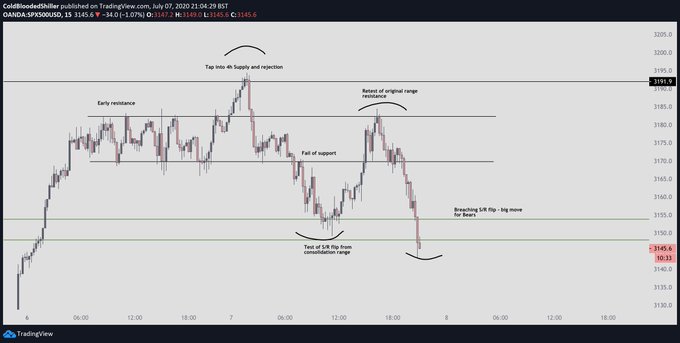Leading Bitcoin higher, global stock markets saw an extremely strong performance on Monday.
As covered by NewsBTC, the Shanghai Composite index and the FTSE China A50 index both set new local highs on a 6% surge. The S&P 500 followed suit with its own gain, rallying 1.5% from last week’s close to Monday’s close.
Bitcoin and the rest of the cryptocurrency market stood to benefit from this stock market strength. One financial services firm in the cryptocurrency space wrote:
“FTSE China A50 Index at new ATHs, surpassing 2015 mania levels. As a proxy for risk sentiment in China, this could bode well for crypto.”
Yet bears have once again denied the stock market, at least in the U.S. Should the correlation between the S&P 500 and Bitcoin hold, this breakdown will negatively affect BTC moving forward.
S&P 500 Forms Breakdown Structure, Hurting BTC’s Upside Prospects
The strength the S&P 500 expressed on Monday quickly turned to weakness on Tuesday. The index slipped 1% lower, failing to surmount the ever-important 3,200 resistance for the umpteenth time in weeks.
Analysts say that this reversal at such an important level shows the S&P 500 is trading in a bearish market structure:
Mapping this out throughout the day. Important breakdown on $SPX. Bears will want to keep that as a fakeout and tap into the supply. Bearish breaking down below. Structure established for bears on LTF here,” a full-time pseudonymous trader commented on the drop.
He shared the chart below conveying the existence of this structure.
Chart of the S&P 500's price action on Monday and Tuesday from trader "Cold Blooded Shiller" (@Coldbloodshill on Twitter). Chart from TradingView.com
Bitcoin is unlikely to benefit from this breakdown, multiple analysts have suggested.
This bearish sentiment is due to the correlation that has formed between the S&P 500 and BTC. A team of JP Morgan analysts commented in June that since March’s crash, “Cryptocurrencies have traded more like risky assets like equities—a significant change relative to the prior couple of years.”
Investor Charles Edwards has observed this correlation too. The digital asset manager recently noted how the S&P 500 and Bitcoin trade almost tick-for-tick in periods of high volatility/uncertainty.
Related Reading: Economist Steve Hanke: Bitcoin Is Not a Currency, It’s a “Speculative Asset”
Bitcoin Still Has Positive Catalysts
Although the S&P 500 is breaking down, Bitcoin still has a number of positive fundamental catalysts.
Mike McGlone, a senior commodity strategist at Bloomberg, said that Bitcoin has an increasing number of active users:
“The number of active Bitcoin addresses used, a key signal of the 2018 price decline and 2019 recovery, suggests a value closer to $12,000, based on historical patterns. Reflecting greater adoption, the 30-day average of unique addresses from Coinmetrics has breached last year’s peak.”
There’s also been a strong increase in a BTC intrinsic value model created by Edwards. The model suggests that Bitcoin is 27% undervalued.
Featured Image from Shutterstock Price tags: xbtusd, btcusd, btcusdt Charts from TradingView.com The S&P 500 Just Formed a Crucial Breakdown — and That's Bad for BTC


















